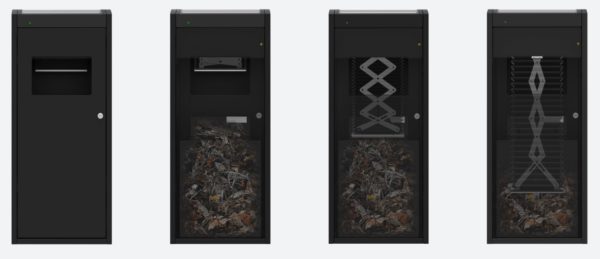The Municipality of Florence, in central Italy, has deployed several solar-powered, self-compacting garbage cans in the city center in recent weeks.
The city government wants to replace almost all conventional garbage cans with the new devices in an effort to reduce garbage collection costs and carbon emissions. “This would mean a 94% reduction in emptying operations, compared to traditional bins, with a strong reduction of CO2 as a result of the reduction in the traffic of collection vehicles in squares and streets of the historic center,” it said in a statement.
The CleanCube cans were provided by Korean manufacturer Ecube Labs. “The baskets installed in Florence are the first generation of the CleanCube,” a spokesperson from Alia Servizi Ambientali SpA, the municipality environmental company, told pv magazine. “To date, there are 11 installed in the historic city center and another six will be installed shortly, in addition to the over 850 standard bins present in the area.”

Each solar-powered can has a capacity of 120 liters of compacted waste, which is equivalent to 600 liters of non-compacted waste. The bins rely on a 35W polycrystalline solar panel connected to a deep cycle battery with a capacity of 38Ah and a voltage of 12V. The battery in turn powers a 120W gear motor which increases the torque. The motor pushes a patented pantograph compactor with a force of 300kg that performs garbage compression.
A laser sensor measures the filling level of the can and communicates it, together with other operating parameters, through a 4G connection to the control software platform of Alia Servizi Ambientali SpA. “All the cans and sensors are connected to this platform providing, to those who manage the collection, a complete picture of the filling level of all devices,” the spokesperson further explained. “Finally, the software processes, and offers statistics relating to, the quantity and frequency of waste collected and the efficiency of the collection, as well as overfilling, for any set reference period.”
According to Ecube Labs website, the CleanCube cans are available in different sizes and capacities. The smallest device measures 500x 550×1,200mm and has a capacity of 100 liters. The largest can has dimensions of 670x770x1,600mm and a capacity of 240 liters.
This content is protected by copyright and may not be reused. If you want to cooperate with us and would like to reuse some of our content, please contact: editors@pv-magazine.com.




2 comments
By submitting this form you agree to pv magazine using your data for the purposes of publishing your comment.
Your personal data will only be disclosed or otherwise transmitted to third parties for the purposes of spam filtering or if this is necessary for technical maintenance of the website. Any other transfer to third parties will not take place unless this is justified on the basis of applicable data protection regulations or if pv magazine is legally obliged to do so.
You may revoke this consent at any time with effect for the future, in which case your personal data will be deleted immediately. Otherwise, your data will be deleted if pv magazine has processed your request or the purpose of data storage is fulfilled.
Further information on data privacy can be found in our Data Protection Policy.